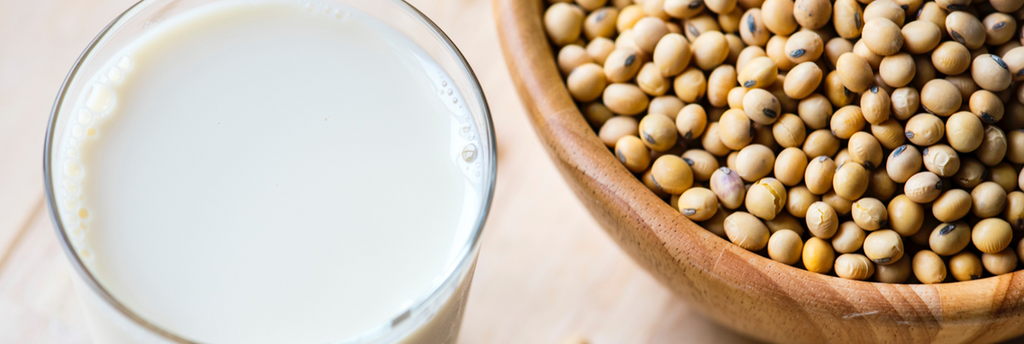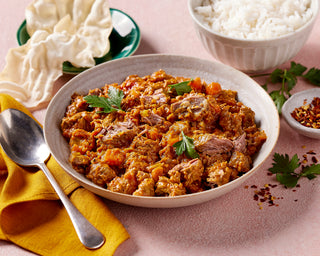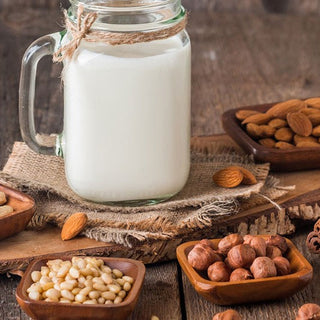
When it comes to ordering a coffee or smoothie, your milk options used to be full cream or skim milk. Oh how things have changed! While some places do still limit the choices you have, there are so many great milk alternatives out there that are appearing in cafes and supermarkets all over.
Whether you’re having milk or milk alternatives, we always recommend that you practice moderation. We always talk about balance & this is no different – your “milk” choices should still create healthy balance in your diet as they do contribute energy and nutritional value to your intake.
Why people go for milk alternatives
There is a raft of reasons why people avoid cow’s milk, so there’s no straight forward answer to this question.
Originally people started searching for milk alternatives because of lactose intolerances or because they simply didn’t like the taste.
In the last few years, however, dietary and lifestyle choices have increased demand for other options. Everything from following a vegan diet, weight management goals, taste, and nutritional requirements have contributed to our desire for new, exciting and delicious “milk” options.
1. Soy milk
Soy Milk is one of the most common milk alternatives out there with many cafes having it readily available. It’s a creamy dairy free option that is known to be high in protein when compared to other milk alternatives, and can be a good source of vitamin D and calcium if fortified.
However, soy milk is also a controversial option thanks to the range of research that has been undertaken on soy beans and their derivatives. It seems that for every study showing health benefits of soy, there are just as many showing possible harmful effects with particular focus on its effects on hormones & fertility.
If you’re a soy milk lover, we recommend going for unsweetened soy milk that is free from additives and thickeners.
2. Coconut Milk
Used in a lot of Asian and Caribbean cooking, desserts, and as a smoothie staple, coconut milk is a delicious milk alternative that is rich & creamy. It comes from the flesh of mature brown coconuts that is then simmered with filtered water and strained (nope, it doesn’t come out of the coconut like that).
It’s become more common in cafes, but we wouldn’t say it’s as common to see as soy or almond milk.
Coconut milk is pretty high in fat including saturated fats called medium chain triglycerides (MCTs), and it also contains a diverse range of vitamins & minerals such as vitamin c, iron, magnesium & potassium. Studies have shown that those MCTs that we just mentioned may help weight loss, reduce appetite and manage caloric intake.
Because of its high fat content, we recommend managing your intake of coconut milk, but also recommend trying a coconut milk hot chocolate. Seriously, it tastes like a Bounty.
3. Almond Milk
Ok, so there are a lot of options when it comes to nut “milks”, they’re versatile and are a great option to use for everything from coffee to smoothies and beyond. We could talk about them all, but our favourites would have to be almond milk, and the increasingly popular macadamia milk.
Almond milk is another one of the most commonly used milk alternatives that you’ll see around, it’s made in a similar way to coconut milk in that the ground almonds are soaked in filtered water, then strained.
From a nutrition perspective, it’s low in calories & saturated fat, rich in mono-unsaturated fatty acids, is a good source of vitamin A, and when fortified it can be a good source of calcium and vitamin D. Almond milk is a good option for those looking to reduce their caloric intake or manage the weight thanks to the lower fat content, swap it in your coffees, smoothies, or with your brekky.
While whole almonds are a good source of protein, almond milk contains very little, so just make sure that you’re getting enough from other sources.
4. Macadamia Milk
Growing in popularity, macadamia milk is one of the richer & creamier nut milks out there because most of its calories come from its fat content. But that fat content is largely in the form of monounsaturated fats which have been shown to help reduce your risk of heart disease & stroke. It also contains omega-7 without going nuts on the calories.
We’d love to see a bit more research done on this one, as its relatively new in the scheme of things, but one thing is for sure – macadamia milk is awesome in iced coffee & because it’s a bit sweeter than other options, it works really well & means you’re less likely to need to add sugar or sweetener if you have a sweet tooth.
5. Oat Milk
Yep, you read that right. Oat milk is the new milk alternative kid on the block when it comes café trends. It’s been around for a while but is starting to gain a following in cafes around Melbourne with some places even swapping to this as their only milk alternative.
For starters, people swear that it tastes as good as cow’s milk (likely because of its more subtle flavour) and many are stating it as a more sustainable alternative to other options like almond milk. But how does it look from a nutrition perspective? Similar to the other milk options we’ve looked at, the nutritional value is nowhere near the same as the whole foods these milks come from. Oat milk contains approximately 35% of your calcium RDI per cup, about 10% of your iron RDI, and low in fat, sugars, and calories.
It’s a great option for people who have allergies or intolerances to dairy, soy or nuts, and is another great vegan option.
Things to remember
Keep in mind that the nutritional value of all these milk alternatives will depend on the brand that you try. We recommend going for unsweetened varieties so you don’t accidentally go crazy on the sugar and looking for organic options when possible to ensure you’re avoiding any harmful pesticides that are often associated with growing things like oats.
Tell us in the comments what your favourite milk alternative is & how you use it!





